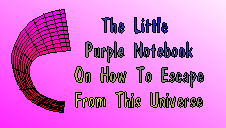
Iris Murdoch wrote in her essay "The Idea of Perfection" (Yale Review, 1964):
"McTaggart says time is unreal, and Moore replies that
he has just had his breakfast. Both these aspects of
philosophy are necessary to it."
The model I would propose
in order to look at the question of time is that of "parallel universes
of
experience."
Eternity is a *qualitative* experience of spirit, and is non-linear. Qualitative experiences and eternal moments are sourced in the direct experience of Spirit itself, one's identity as spirit, and what I have called the unchanging and classical "Ultimate Ideas": the Good, the True, and the Beautiful. All experiences and judgments of quality are ultimately derived from our intuitive sense and recollection of the Good, the True, and the Beautiful; our understanding of these Ideas (eidos) are the standards by which we assess all other things. Thus eternity constantly plays on our thoughts nearly every consideration, whether we are fully aware of it or not.
Time is a *quantitative* experience of ordinary mind, and is linear.
The INTERWEAVING of experiences of eternity and time are an integral part of what we call human life. And also what is meant in part by the mystic-Christian expression "in the world but not of it."
Many attributes and activities of spirit have a lesser mirror image in the world, often to the point of reversal. Steadfastness is an attribute of spirit and therefore an experience in eternity; persistence applies to time. In spirit we "behold", in ordinary mind we "see." Spirit is intelligence itself, ordinary mind is intellect. In spirit we know directly the essence of things (noesis), in ordinary mind we hold opinions (doxa) or positions, and seek after evidence and proofs. In spirit there is dominion and the bestowing of empowerment and freedom, in the world there is domination and the denial of empowerment and freedom. In spirit there is abundance unlimited, in the world there is seemingly no end to scarcity. In the spiritual universe there are absolutes, in the physical universe there are no absolutes.
Confusion reigns when we fail to distinguish between two sorts of consciousness: consciousness that needs no body (spirit) and consciousness that needs a body/brain (ordinary mind). So we end up asking questions like, "Is time real or not?" And saying things like "There is no time," or "Moore just had his breakfast (so there must be time, else it wouldn't make sense to say that)."
Spiritual mind and ordinary mind, although these seem to "nest" and interact much of the time, function quite differently and they access entirely different sorts of information, complementary information necessarily for a fullness of knowledge and understanding, including how to live an ethical life on earth.
The soul, which is the marriage of heaven and earth (or spirit and matter) in the human being, resides so to speak in the heart and participates in both eternity and time. When one knows oneself as spirit, and speaks from the heart, a sense of the miraculous is present and one shares the richness of life in a sacred space. Thus there is an equivalent to eternity with regard to space and that is sacred space, also a qualitative experience, with its sense of infinity, expansiveness, spiritual presence, and quality of being. Sacred space is not an empty space but rather a full space, full of spirit or spiritual substance.
One goal of Humanity as a whole is to bring more of an awareness of eternity and sacredness into everyday life. This shows up in many ways, including appreciation for simple things, special ways of noticing and paying attention, being fully present spiritually, deep authenticity, and in caring and secure relationships.
We could graph the relationship of eternity and time thus, in a parallel and interactive model:
Spirit
Experience of Eternity
/ | \
\|/ /
| \
<-------
W ------------------------------------------->
/|\
Experience of Time:
past
present
future
At any point in time on the
timeline above, a web sub-model (W) can be created that links the beliefs/ideas/feelings/perceptions
the person has at that point in time with any and all other beliefs/ideas/feelings/perceptions
in the person's experience that he would associate with those. That
web could well-nigh include the totality of a person's entire life experience
in each moment, including experiences of spiritual identity, eternity and
sacred space by association, into an integrated whole. Phenomenologically
however, the person may be consciously aware of only a few of these associations,
even though the entire web is operative in a myriad of not-so-obvious ways.
Additionally, there are beliefs *about* one's beliefs in this web of ideas,
meta-beliefs if you will, that need to be taken into account as conditioning
factors in one's experience.
(W.V.O.
Quine, WEB OF BELIEF, New York: Random House,
1970.)
(Alfred Korzybski, SCIENCE AND SANITY, 1933.)
Therefore, in order for processwork to be effective it needs to address both universes of experience: the eternal and the temporal. (I would add that processwork needs to address all kinds of space as well: physical and logical space, and also sacred space.) One without the other is incomplete and will result in an unbalanced and ineffective individual. The more the eternal and sacred can be brought to bear on the temporal and interact with the temporal, the faster and easier permanent healing can take place, since the person will consciously create differently in the future (from the perspective of spiritual creativity). Indeed, the spirit will heal the body and the life, and there is then the possibility of a grand and glorious life that we have all suspected is our rightful heritage, true status, and destiny.